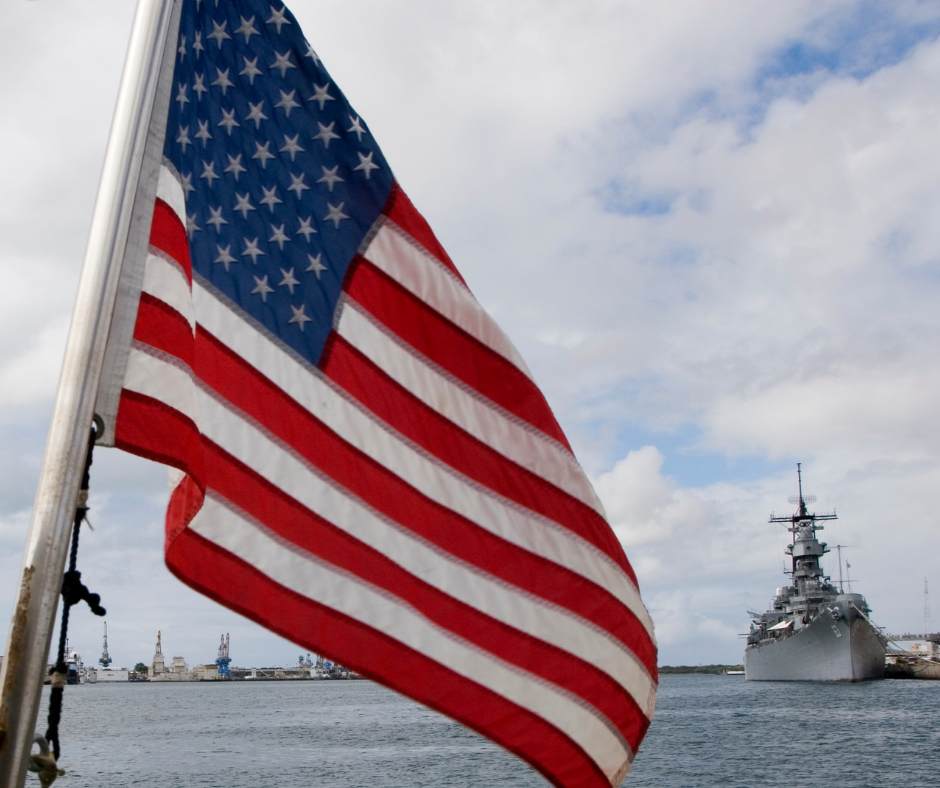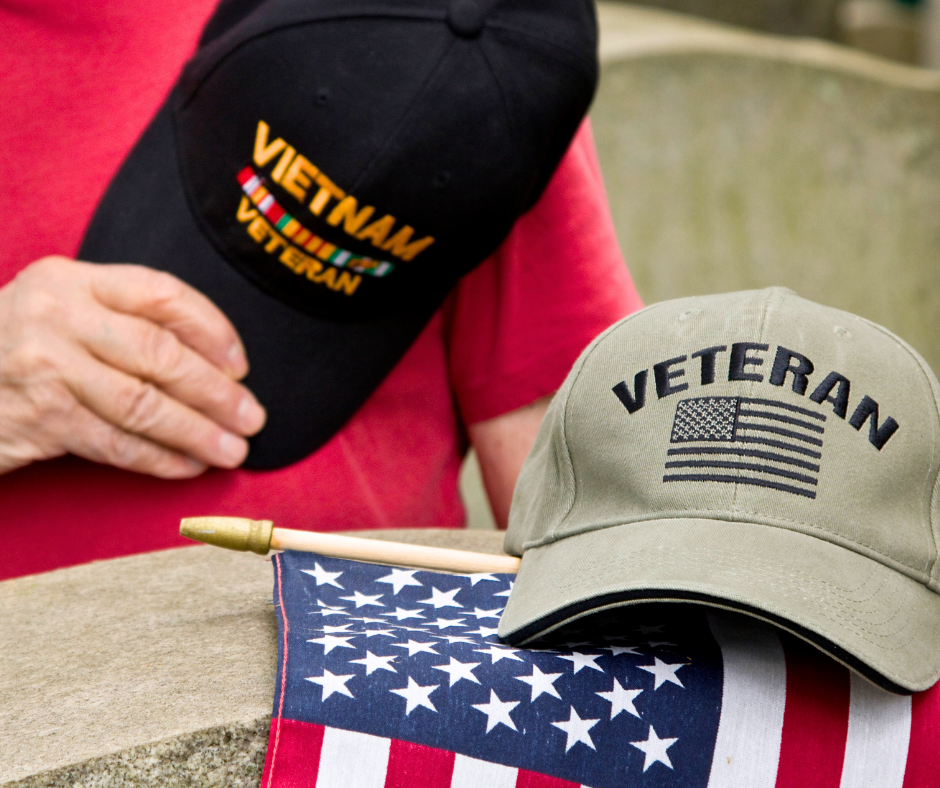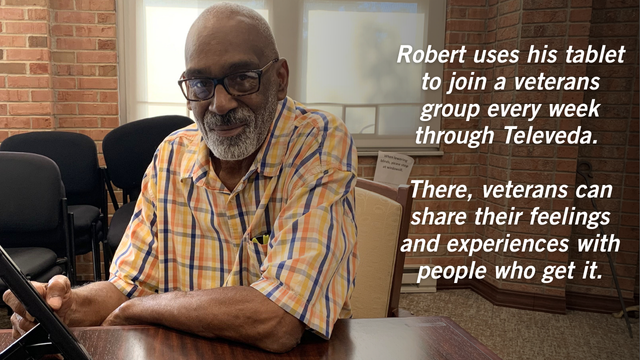When Robert Burns joined the U.S. Navy at 17, he liked his odds with the forces of nature. It turns out he’s a force to be reckoned with, too. He’s survived not only the Vietnam War and a typhoon but the echoes of battle playing in his mind ever since.
Those forces are not enough to stop Robert. Over the last few years, he has discovered relief in sharing his struggles with others. He finds comfort and joy in his children and grandchildren, who brighten his day with their unconditional love.
Born and raised in Cincinnati, Robert spent much of his life elsewhere—first in the Navy and then as a bus driver for sports teams. Now, he is happy to be back home. He is closer than ever to his family, thanks in part to Meals on Wheels’ Digital Connect program, which allows Robert to keep in touch with his family and access an online veterans group.
SERVING DURING WARTIME
 Robert joined the Navy just out of high school, inspired by the military service of his grandfather and many family members. The deepest water he had been in, until that point, was only 12 feet. During his first tour, he experienced the ultimate force of nature: a typhoon.
Robert joined the Navy just out of high school, inspired by the military service of his grandfather and many family members. The deepest water he had been in, until that point, was only 12 feet. During his first tour, he experienced the ultimate force of nature: a typhoon.
Off the coast of Japan, he and his fellow sailors faced 30-foot waves, running from one side of their destroyer to the other to balance the ship. Robert weathered the storm. One of his roles on the destroyer involved manning and firing the guns from inside the turret. He was right beside the naval guns as they shot off, the force of the explosion ricocheting through his body and ringing through his ears, blast after blast after blast.
“Them booms. Some days I still hear them. Some days they’re really, really loud,” he says.
When Robert returned home in 1975, the booms came with him.
ECHOES OF BATTLE
 There were no answers for Robert and other veterans who were physically fine but fighting their own mental battles. Post-traumatic stress disorder (PTSD) had not yet been recognized. It was impossible to receive the medical care he needed.
There were no answers for Robert and other veterans who were physically fine but fighting their own mental battles. Post-traumatic stress disorder (PTSD) had not yet been recognized. It was impossible to receive the medical care he needed.
Robert says he was angry—angry that he couldn’t get help, angry that he felt different from everyone else, angry from grief, angry that people treated him like he was crazy. It would be decades before he was diagnosed with a mild traumatic brain injury (TBI) that underscored his everyday life with just feeling mad.
Robert suffered alone, his mind like a jackhammer for days or weeks on end. It robbed him of his childhood memories. It kept him from socializing. He explains, “It’s like I’m having a seizure but my body’s not moving.”
While his loved ones celebrated family events, he sat inside by himself. He wanted to join them in the fun but could not shut off the pain inside his head.
“I spent a lot of my time by myself just trying to ask God to not let my brain erupt,” he recalls.
Through that time, Robert kept working. It was a lesson that had been instilled in him by his parents: Work hard. He was a bus driver for sports teams, including the Cincinnati Reds, the Bengals and the Harlem Globetrotters. When Hurricane Katrina struck in 2005, Robert drove a bus down and stayed for six weeks to help, serving as a light for others.
A WAY FORWARD
Two decades past his time in active duty, Robert was tired. He decided to seek help.
“God, I just needed to see what was going on with me because I struggled for so many years not knowing,” Robert recalls, adding that not knowing is, in itself, part of the challenge.
In 2004, he finally had a diagnosis: PTSD and TBI from the blasts of the naval gun.
“When they diagnosed me, I said, ‘Okay, at least I know that something is wrong for real. I’m not crazy,’” he says. “It was like, ‘Whew, okay, so now what are we going to do? How can I slow my mind down? It seems like I’ve been going on 100 for a long time.’”

Robert started sharing his struggles with others about five years ago. In doing so, he was finally able to slow his mind down. It paved the way for him to take better care of his mental health. He can now focus on managing his physical health and even learning new things.
And Robert loves to learn new things. When Meals on Wheels offered classes on digital skills through the Digital Connect program, he jumped right in. Older adults take classes on how to navigate the internet through their tablet, and upon completion, they earn a tablet of their own to keep.
Now, he stays connected with his family through his tablet, chatting with his grandkids about their basketball games through video calls and staying up-to-date with their daily lives.
He also uses his tablet to join a veterans group through Televeda. Every week, Robert logs on to an hour-long virtual program by vets and for vets. There, veterans can share their feelings and experiences with people who get it.
“You can really tell how you feel. You can even cry,” he says. Sharing the pain helps to ease it.
Robert says he is grateful to finally open up and connect with fellow veterans, and he wants others to find that relief too: “I just think about so many vets that have to live with these chronic conditions that nobody can see.”
Robert still grapples with his PTSD, but he can talk about it now and find solace in being seen and heard. He doesn’t suffer alone anymore.
Even with these troubles, Robert enjoyed his time in the Navy, and he is deeply proud of his service to the country. He is, without a doubt, a mighty force.
